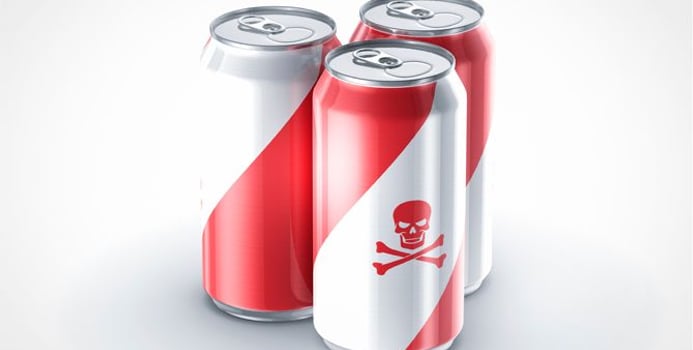On paper, diet soda may seem like the health-conscious choice. It saves you the 140+ calories you might find in their sugary soft-drink counterparts, all the while still satisfying your urge for some sweet carbonation. However, there is more to these chemical cocktails than meets the eye. Despite cutting calories, you may have just created some new health concerns.
1. Lack of Nutritional Value
When you drink diet soda, you may be avoiding calories, but you're also not consuming something that does your body any good, either. The best no-calorie beverage? Water. It is essential in keeping a healthy body, a clear mind and an adequate balance within our tissues. Many of our bodily processes depend upon water, so replacing it with a diet soda deprives your body of these functions. If it's the carbonation of soda that you crave, opt for a sparkling water instead.
2. It Confuses Your Body
Artificial sweeteners have a more intense flavor than real sugar. Over time, diet soda or other artificially sweetened products can dull your senses to naturally sweet foods, such as fruits. In addition, these sugar-imitators have been shown to exert the same effect on your body as regular sugar. The brain normally associates "sweet" with calories. This drives your body to release insulin as a sugar chaperone to the cells to create fuel. A 2013 study found that individuals who consumed a specific sweetener (sucralose) still had these releases of insulin and had an increase in blood glucose levels. This unnecessary release can lead to an increased risk of insulin resistance and type 2 diabetes.
3. Linked to Weight Gain
Diet soda, though calorie-free, won't necessarily help you to lose weight. Researchers at the University of Texas found that over the course of a decade, diet soda drinkers had a 70% greater increase in waist circumference compared with non-drinkers. Research suggests that the brain reacts to artificial sweeteners much in the same way as it does to sugary sweets. Ingesting them often may lead to an increased desire for high-calorie foods such as sugary treats, putting you at an increased risk of weight gain.
4. Bad for Your Bones
The same chemicals in soda that are bad for your teeth can also rob calcium from your bones. For adults, a decrease in bone mineralization can lead to osteoporosis, a disease in which the bones become increasingly fragile. While this decrease in bone mineralization is common among aging individuals, researchers have found that drinking soda, including diet soda, can compound this problem. Lower bone mineral density and increased excretions of calcium have been demonstrated in individuals consuming soda as compared to individuals consuming water.
So while it may seem like a guilt-free go-to, quenching your thirst with diet soda may be doing your body more harm than good. Look for more natural alternatives, or just rely on plain old water to satisfy your thirst and ensure that your body is properly hydrated and receiving the support that it truly needs.
Sarah Dreifke is a freelance writer based in DeKalb, IL with a passion for nutrition education and the prevention of chronic disease. She holds a Bachelor of Science in both Dietetics and Life Sciences Communication from the University of Wisconsin-Madison. Currently, she is working towards a combined Master's Degree in Nutrition and Dietetics as well as a dietetic internship at Northern Illinois University.




